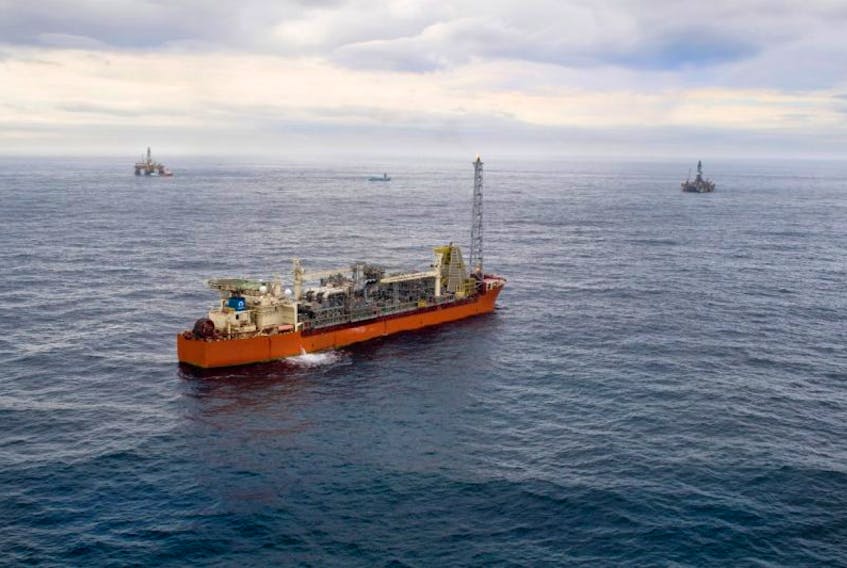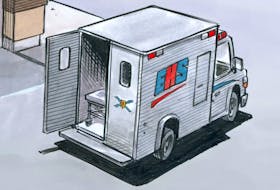Husky Oil, the provincial government and the Canada-Newfoundland and Labrador Offshore Petroleum Board (CNLOPB) have apparently taken inspiration from the world’s best-ever book title — “Your Call Is Important to Us: The Truth About Bullshit.”

This week the CNLOPB ordered Husky to stop pumping oil with its SeaRose offshore drilling ship because rules regarding an encroaching iceberg were ignored last year.
All three players — the company, the board and the government — stated workers’ safety is their primary priority.
It is demonstrably bull----.
The company
On March 29, 2017, an iceberg floated to within 180 metres of Husky’s SeaRose FPSO (floating production, storage and offloading vessel) at the White Rose offshore field. According to the CNLOPB, when an iceberg floats within one-quarter of a nautical mile (463 metres) of the FPSO, the SeaRose is required to disconnect and sail away.
Both Husky and the CNLOPB acknowledge the SeaRose did not disconnect and sail away.
The iceberg came twice as close to the SeaRose as regulations permit (180 vs. 463 metres). In a news release Wednesday, the CNLOPB stated “personnel were at one point instructed to muster and ‘brace for impact.’”
Concern for safety would be obeying the rule to disconnect and move the ship. Bracing for impact is a distant second choice.
In a news release issued the day after the incident, the CNLOPB said the iceberg came within 180 metres of the SeaRose at 5:30 a.m. A mere 30 minutes later, at 6 a.m., the iceberg had “passed the vessel” and was outside the 463-metre exclusion zone.
A slight shift in direction, due to wind or current, could have quickly led to a workplace “accident” and/or an environmental disaster. The fact neither happened is due entirely to luck.
The board
The glacial pace of bureaucratic action is legendary, but the length of time between the two significant dates of this episode is astounding.
The iceberg approached the SeaRose on March 29, 2017.
The CNLOPB announced its order that Husky suspend its operations at the White Rose field on Jan. 17, 2018.
The gap between the two events is almost 10 months.
Concern for workers’ safety after such an incident would entail an immediate suspension order. The next day, say. Or the same week. But a suspension order almost a year after the fact strains credibility.
The CNLOPB, in its Wednesday news release, explains its tardiness thus: “This decision to suspend operations was taken now because of the preliminary report findings, which included: Husky did not follow its IMP (ice management plan); onshore senior management did not ensure the IMP was followed; and the offshore installation manager failed to disconnect in accordance with the IMP.”
In other words, Husky ignored the rules.
It took the board almost 10 months to determine this, and to act on it. In the bureaucratic mindset, this apparently displays concern for safety.
None of the news releases, as of Thursday, mentioned penalties or fines — whether they apply to this situation, and/or whether they will be imposed.
A fine in the millions? In the thousands? Give the CNLOPB another year to calculate it.
The government
Environmentalists will rightly cite the iceberg incident as proof that oil companies and the CNLOPB cannot be trusted with care for the ocean.
In a similar vein, the CNLOPB should not be empowered to oversee workplace safety in the offshore industry.
You may recall — even if the provincial government doesn’t — that one of commissioner Robert Wells’ recommendations arising out of the Offshore Helicopter Safety Inquiry in 2009-10 was that a separate entity, other than the CNLOPB, should be created and have authority for safety in the offshore industry.
Wells made that recommendation almost 7 ½ years ago. The provincial and federal governments have not acted on it.
Safety a No. 1 priority? “Your call is important to us …”
Brian Jones is a desk editor at The Telegram. He can be reached at [email protected].









